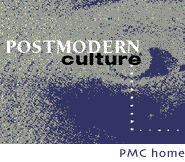
Abstracts
Volume 18, Number 3May, 2008
- Abstract: This essay sketches a dialogue between the government-sanctioned, nuclear "scare" films of the 50s and 60s and the dissident, nuclear-themed popular media of the same time period. Through their direct and indirect indictment of the government's fallacious claims about the causes, effects, and survivability of nuclear war, these popular films served to shift the enabling dialogue of nuclearism so as to diminish the actual threat of war. While the positive effects of such dissident media were usually unintentional or else incidental, their success has nonetheless shown how to make anti-nuclear statements that are both viable and effective. Nuclear annihilation is unique in that it is a potentiality that gains inevitability through its own discussion, and so texts that wish to diminish its power need to address specific criteria outlined in the essay. --ta
- Abstract: This essay considers one of the more intriguing techno-events of this decade: the claim of the Irish technology company Steorn to have produced a perpetual motion device, the Orbo. Although its promised demo in July 2007 failed to produce a working device, events leading up to and beyond the failed demo offer a case study in what Galloway and Thacker define as an "exploit," "a resonant flaw designed to resist, threaten, and ultimately desert the dominant political diagram." Selecting its own jury to test and validate the Orbo, the company has resisted the normal scientific validation process. Enlisting the aid of an "outernet" workforce, Steorn has challenged traditional business models as well. Unfortunately, Orbo's failure has put a reverse spin on the Steorn Exploit and its viral marketing campaign, demonstrating that viruses not only spread but also mutate. Embarking on its own exploit, Steorn's on-line forum has morphed into a webmind whose emergent properties recall Goertzel's psynet, "a self-organizing network of information-carrying agents." "Mobile agents," forum members create new links and provide each other feedback as they sort through the multiple drafts of Steorn's narrative. Scripted into this narrative, they must also do battle with other counter-exploitive elements such as Herr Doktor Mabuse, a nightmarish perversion of Steorn's original vision. Whether or not the forum endures depends paradoxically on the very spirit of contestation that drives its--and Steorn's--operations. --jf
- Abstract: A set of English-language feature films, mostly released at the turn of the century, offer protagonists who do not know that they are spies. Scholars have suggested that such culture can be postmodern in theme, in clarity, and in production at the same time. But this essay shows that these films hew to norms of classical narrative and have been used to shore up a modernist sense of authorship. They follow on Jameson's influential formulation of a postmodern aesthetic, using surreal film style to convey hallucinations and telling of protagonists who come to know that they are brainwashed. But scholarly arguments that Hollywood has sacrificed clarity to postmodern ambiguity are based on selective studies of art films and stories of insanity, and are disconfirmed by studies of these mind job films. These movies owe neither to large-scale demand for postmodern themes nor to postmodernity in financial affairs, but rather to a small group of filmmakers who took inspiration from brainwashing scares and such novelists as Burroughs and Dick. Those filmmakers emphasize their own modernist authorship by using flashy technique to tell stories of compromised agency. --nk
Tristan Abbott, Bomb Media, 1953-1964
John Freeman, The Steorn Exploit and its Spin Doktors, or "Synergie ist der Name of das Spiel, my boy!"
Neal King, Secret Agency in Mainstream Postmodern Cinema
Copyright © 2008-1990 Postmodern Culture CONTENTS OF THIS ISSUE ARE AVAILABLE FREE OF CHARGE UNTIL RELEASE OF THE NEXT ISSUE. A TEXT-ONLY ARCHIVE OF THE JOURNAL IS ALSO AVAILABLE FREE OF CHARGE. FOR FULL HYPERTEXT ACCESS TO BACK ISSUES, SEARCH UTILITIES, AND OTHER VALUABLE FEATURES, YOU OR YOUR INSTITUTION MAY SUBSCRIBE TO PROJECT MUSE, THE ON-LINE JOURNALS PROJECT OF THE JOHNS HOPKINS UNIVERSITY PRESS.
